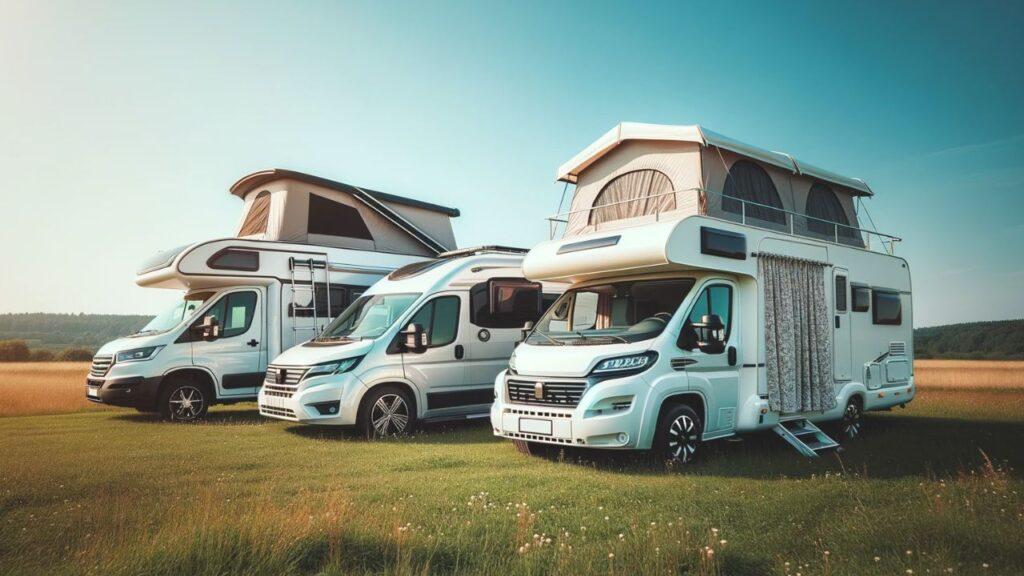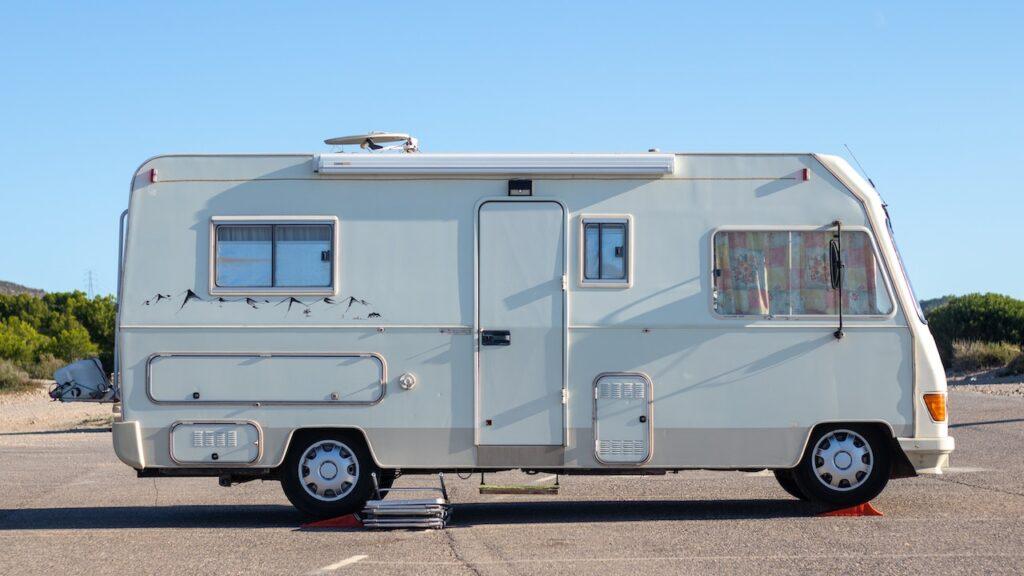Reliable RV power starts with the right battery—especially if you’re camping off-grid or running appliances overnight. The best RV deep cycle batteries, ranging from 100Ah to 300Ah, are designed to deliver steady 12V power for lights, fridges, and electronics. In this guide, we’ve reviewed and ranked top lithium, AGM, and gel models based on lifespan, charging speed, and real-world performance to help you stay powered up wherever you park.
We’re reader-supported. When you buy through links on our site, we may earn an affiliate commission. As an Amazon Associate, we earn from qualifying purchases, at no extra cost to you.
Best Deep Cycle Battery for RV: Our Top Picks
- Best Overall Option: LiTime 12V LiFePO4 Deep Cycle Battery
- Best Lithium Option: WEIZE 12V 100Ah LiFePO4 Lithium Battery
- Best Versatile Option: Renogy Deep Cycle AGM Battery 12 Volt 200Ah
- Best Value Option: LiTime 12V PLUS LiFePO4 Deep Cycle Battery
- Best Budget-Friendly Option: FEENCE 12V 100Ah LiFePO4 Battery
- High-Performance Option: ECO-WORTHY 12V LiFePO4 Deep Cycle Battery
- Compact Option: LiTime 12V 100Ah Group 24 Bluetooth LiFePO4 Battery
- Solar Integration Option: KEPWORTH 12.8V 100Ah LiFePO4 Battery
- Cold Weather Option: Renogy Deep Cycle AGM 12 Volt 100Ah Battery
- Lightweight Option: ECO-WORTHY 12V 100AH LiFePO4 Lithium Battery
1. Best Overall Option: LiTime 12V LiFePO4 Deep Cycle Battery

Quick Specifications
- Manufacturer: LiTime
- Weight: 24.25 Pounds
- Dimensions: 6.77″D x 13″W x 8.43″H
- Amperage: 100Ah
- Voltage: 12.8 Volts
- Battery Cell Composition: Lithium-Phosphate
- Reusability: Rechargeable
- Number Of Cells: 4
When looking for a deep cycle battery that balances efficiency, power, and longevity, we think the LiTime 12V 100Ah LiFePO4 is a solid choice. It delivers stable power output, making it useful for RVs, solar energy setups, marine use, and home storage applications. It’s lightweight, which is always a plus, and offers a long cycle life, meaning fewer replacements over time.
From our perspective, what makes this battery stand out is its high efficiency and consistent performance. It holds 95% of its capacity for extended periods, which means more usable power compared to traditional lead-acid batteries. Whether you’re traveling in your RV, living off-grid, or just need a reliable backup power source, this battery does the job well.
Pros
- Lightweight and easy to move compared to lead-acid alternatives
- Long lifespan with up to 15,000 cycles at lower discharge rates
- High efficiency with a flat discharge curve for consistent power output
- Works well in various applications, including solar systems, RVs, camper van
Cons
- Not designed for engine starting, only suitable for energy storage purposes
- May require an upgraded charger if switching from lead-acid to LiFePO4
From our standpoint, the LiTime 12V LiFePO4 is an excellent choice for those looking for a versatile and reliable deep cycle battery. It provides steady power, a long lifespan, and impressive efficiency, making it a practical option for RVers, campers, and solar power users. If you’re looking for a dependable battery that performs well in different situations, this one is definitely worth considering.
2. Best Lithium Option: WEIZE 12V 100Ah LiFePO4 Lithium Battery

Quick Specifications
- Manufacturer: WEIZE
- Weight: 21.8 Pounds
- Dimensions: 6.61″D x 10.24″W x 8.27″H
- Amperage: 100Ah
- Voltage: 12.8 Volts
- Battery Cell Composition: Lithium-Phosphate
- Reusability: Rechargeable
- Number Of Cells: 4
If you’re looking for a lithium battery that works well for RVs and camper vans, this one from WEIZE is worth checking out. It’s smaller and lighter than most other 100Ah batteries, which makes a big difference when you’re working with limited space in an RV. Even though it’s compact, it still puts out 1280Wh of energy, so you’re not losing any power. That’s a big plus for people who need reliable power on the road but don’t want to deal with bulky, heavy batteries.
One thing we really like about this one is the built-in Battery Management System (BMS), which helps protect it from overcharging, overheating, and short circuits. It also has low-temperature protection, so if you’re camping in colder places, you don’t have to worry as much about performance issues. Plus, with up to 8000 cycles at 50% depth of discharge, this thing is built to last way longer than a typical lead-acid battery. From our standpoint, it’s a solid upgrade for anyone who wants less weight, more power, and fewer battery headaches.
Pros
- Takes up less space and is lighter than traditional batteries
- Lasts way longer than lead-acid options, making it a good long-term investment
- BMS protection keeps it safe from overcharging, short circuits, and overheating
- Handles cold weather better than some other lithium batteries
Cons
- Not for starting engines, so it won’t work as a cranking battery
- Needs a lithium charger, which might mean buying extra gear if switching from lead-acid
In our opinion, for RV and camper van owners, this battery makes a lot of sense. It’s light, compact, and reliable, which are all things you need when you’re on the move. It’s got good safety features, works in different temperatures, and lasts longer than most batteries out there. If you’re looking for a strong lithium option that won’t take up too much space in your setup, this one is worth considering.
3. Best Versatile Option: Renogy Deep Cycle AGM Battery 12 Volt 200Ah
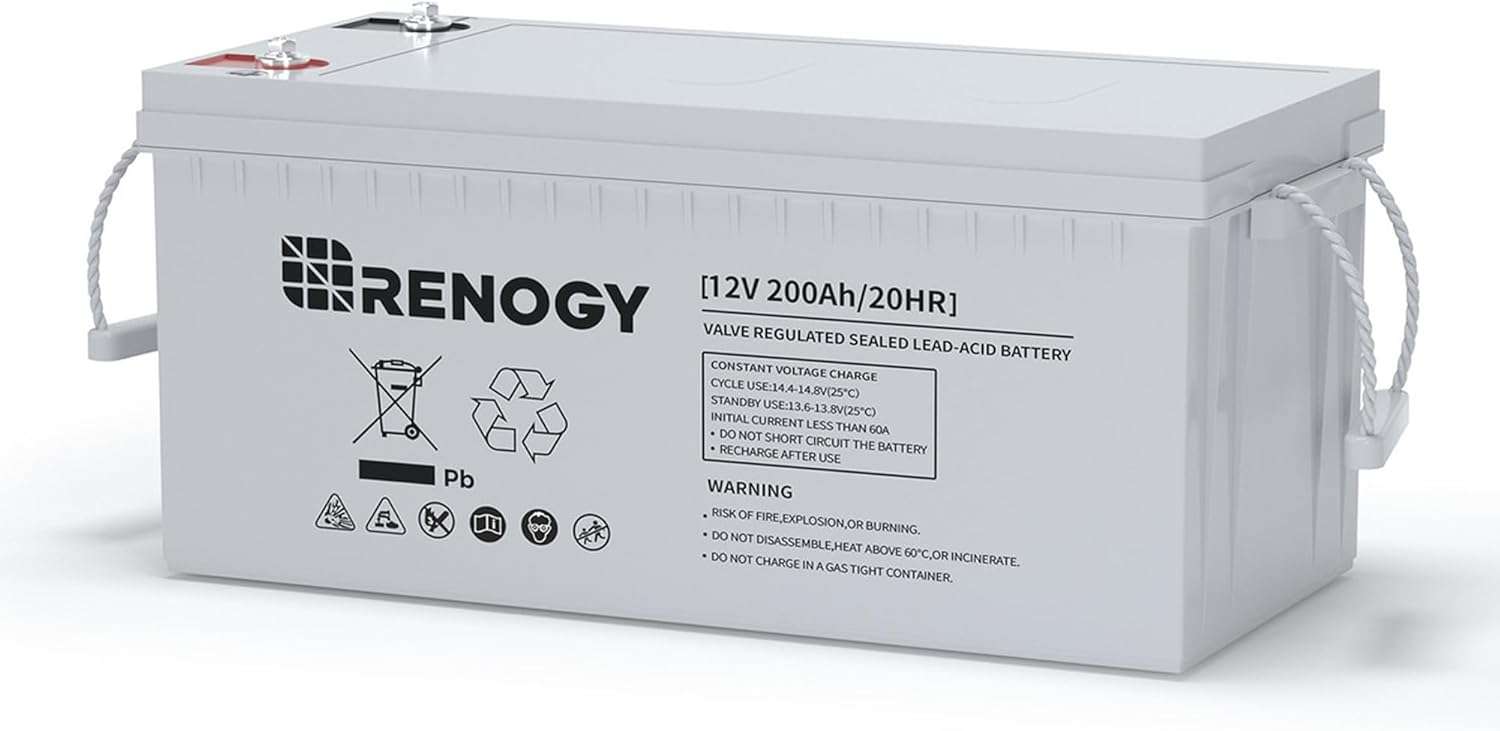
Quick Specifications
- Manufacturer: Renogy
- Weight: 127.9 pounds
- Dimensions: 20.5 x 9.4 x 8.8 inches
- Amperage: 200 Amps
- Voltage: 12 Volts (DC)
- Battery Cell Composition: Lead-Acid, AGM
- Reusability: Rechargeable
Renogy’s 12 Volt 200Ah Deep Cycle AGM Battery represents a pinnacle in power storage solutions, especially for RV enthusiasts. We’ve found this battery to be a game-changer for sustaining a comfortable off-grid lifestyle. Its robust build and efficient energy storage make it ideal for RVs, cabins, marine, and other off-grid systems. The maintenance-free aspect means more time exploring and less time fussing with battery upkeep.
Furthermore, the battery’s excellent discharge performance and long shelf life are highly impressive. The low self-discharge rate of just 3% per month at 77°F ensures reliability over extended periods. Its wide operating temperature range allows for versatility in various climates, enhancing its appeal to a broad spectrum of users. Moreover, the battery’s safety features, like being leak-proof and non-gassing, add an extra layer of assurance for us during our travels.
Pros
- Maintenance-free design simplifies use.
- High discharge currents of up to 2000A maximize utility.
- Impressively low self-discharge rate for prolonged shelf life.
- Operates effectively in a wide range of temperatures.
Cons
- Heavier weight may require careful planning for installation.
- Higher upfront cost, but offers value in the long run.
The Renogy 12 Volt 200Ah Deep Cycle AGM Battery stands out as the overall choice. It balances performance, reliability, and ease of use impeccably. Its suitability for a range of applications, coupled with its low maintenance needs, makes it an ideal choice for powering RV life. We’ve experienced firsthand how it reliably powers most home appliances, making it indispensable for our off-grid adventures.
4. Best Value Option: LiTime 12V PLUS LiFePO4 Deep Cycle Battery

Quick Specifications
- Brand: LiTime
- Dimensions: 8.2″D x 21″W x 8.5″H
- Number of Cells: 8
- Resistance: 40 Milliohms
- Terminal: M8
- Weight: 48.3 pounds
- Voltage: 12 Volts (DC)
- Amperage: 200 Amps
The LiTime 12V 200Ah PLUS Lithium LiFePO4 Battery is a standout choice for RVers seeking optimal value without sacrificing performance. This battery’s automotive-grade lithium cells deliver high energy density and stability, making it a reliable power source. We’ve come to appreciate the peace of mind that comes with its UL Testing Certificates and built-in BMS, ensuring protection against common electrical issues.
Furthermore, its exceptional energy density translates to a lighter, more powerful battery compared to many competitors. Its versatility in applications, from RVs to solar and marine uses, along with expandable capacity, caters to a variety of power needs. The long service life, boasting over 4000 cycles and a 10-year lifetime, makes this battery a wise investment for long-term RVing.
Pros
- High energy density for lighter, more powerful performance.
- Safety and reliability with automotive-grade lithium cells.
- Versatility in applications with expandable capacity.
- Exceptional service life with over 4000 cycles.
Cons
- Slightly higher upfront cost compared to lead-acid batteries.
- Compatibility requires a specific battery box size (Group 4D).
The LiTime 12V 200Ah PLUS Lithium LiFePO4 Battery presents an excellent value proposition. Its blend of efficiency, longevity, and safety features makes it a prime choice for powering RV adventures. This battery is a long-term investment, promising dependable power for diverse off-grid and mobile applications.
5. Best Budget-Friendly Option: FEENCE 12V 100Ah LiFePO4 Battery
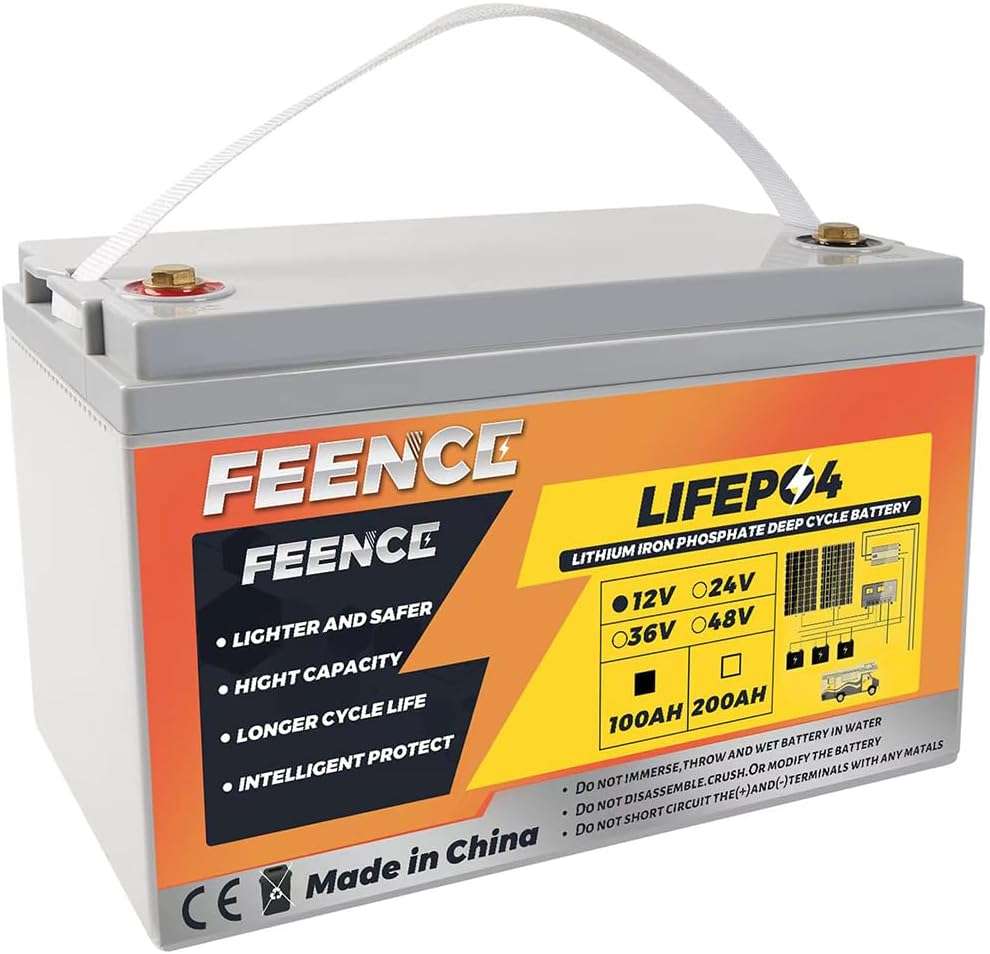
Quick Specifications
- Manufacturer: FEENCE
- Weight: 24 Pounds
- Dimensions: 6.8″D x 12.8″W x 8.46″H
- Amperage: 100Ah
- Voltage: 12.8 Volts
- Battery Cell Composition: Lithium-Phosphate
- Reusability: Rechargeable
- Number Of Cells: 4
Alright, let’s talk about the FEENCE 12V 100Ah LiFePO4 battery. If you’re looking for a budget-friendly deep cycle battery for your RV, but still want something reliable, this is worth checking out. It’s got 1280Wh of power, so it can handle your basic RV needs, whether you’re running solar panels, powering a trolling motor, or just need something solid for off-grid camping. Plus, it’s super lightweight, which is always a win when dealing with RV setups.
What we like about this one is that it’s got a built-in 100A BMS (Battery Management System), so it protects itself from overcharging, over-discharging, and short circuits. That means you’re getting a battery that isn’t just cheap upfront but also lasts a long time. The cycle life is over 7000 cycles, which is huge compared to lead-acid batteries. If you’re out on the road a lot or even just using it for home backup power, you won’t have to replace it anytime soon.
Pros
- Lightweight, about a third of what a lead-acid battery weighs
- Long lifespan with over 7000 charge cycles
- Charges fast, only takes around 3.5 hours with a 30A charger
- Can be expanded in series or parallel for more power if needed
Cons
- Doesn’t perform the best in very cold weather, might need insulation
- Ships in either black or white at random, no option to choose color
In our opinion, if you need an affordable lithium deep cycle battery for your RV, this one makes a lot of sense. It’s light, lasts long, and charges fast, all without costing a fortune. From our experience, it’s a solid choice for off-grid camping, RV setups, and even solar home backup. If you’re looking to ditch lead-acid batteries but don’t want to spend a fortune on lithium, this could be the right one for you.
6. High-Performance Option: ECO-WORTHY 12V LiFePO4 Deep Cycle Battery

Quick Specifications
- Brand: ECO-WORTHY
- Voltage: 12V
- Amperage: 280Ah
- Dimensions: 9.49″D x 20.98″W x 8.82″H
- Number of Cells: 2
- Weight: 63.9 pounds
- Charge Cycles: 6000+ Deep Cycles
The ECO-WORTHY 12V 280Ah LiFePO4 Lithium Battery excels as a top-tier choice in the high-performance category. It’s ideal for RV enthusiasts and off-grid system users who seek the utmost in quality and reliability. Its lightweight yet powerful design makes installation a breeze, changing the way we power our adventures. We have been especially impressed by its capacity for expansion, making it versatile for a range of applications.
Furthermore, the built-in 200A BMS provides peace of mind, safeguarding against common battery issues while maintaining optimal performance. The battery’s ability to withstand over 6000 deep charge cycles ensures longevity and reliability, significantly outperforming traditional lead-acid batteries. Its compatibility with fast charging and solar panel charging adds to its appeal for sustainable energy solutions.
Pros
- Lightweight design simplifies installation and handling.
- Vast energy storage capacity, perfect for heavy-duty use.
- Long lifespan with over 6000 deep charge cycles.
- Built-in BMS for enhanced safety and performance.
Cons
- Higher initial investment compared to standard batteries.
- Requires specific charger for optimal charging efficiency.
The ECO-WORTHY 12V 280Ah 2Pack LiFePO4 Lithium Battery is the top choice for high-performance needs. Its combination of lightweight design, vast energy capacity, and longevity makes it ideal for powering RVs, boats, and solar off-grid systems. This battery represents a long-term investment in quality and reliability, making it the go-to option for those who require the top in their off-grid power solutions.
7. Compact Option: LiTime 12V 100Ah Group 24 Bluetooth LiFePO4 Battery
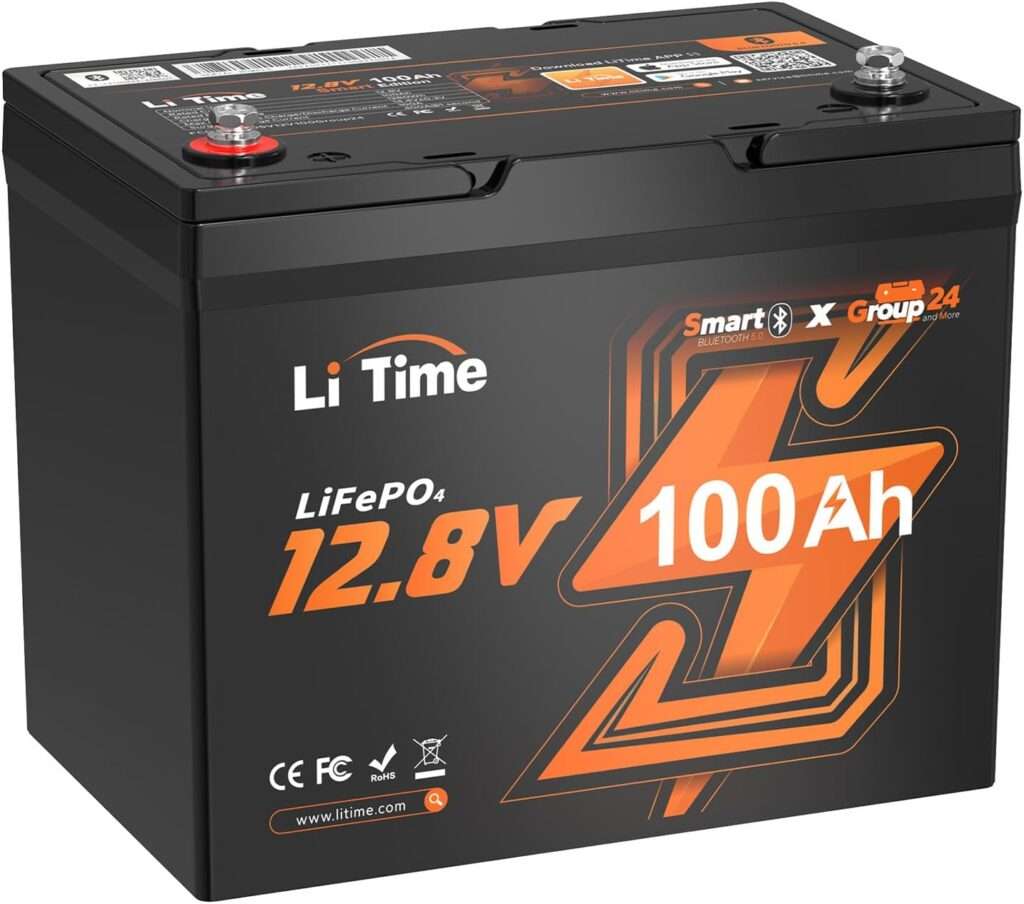
Quick Specifications
- Manufacturer: LiTime
- Weight: 21.8 Pounds
- Dimensions: 6.61″D x 10.24″W x 8.3″H
- Amperage: 100Ah
- Voltage: 12.8 Volts
- Battery Cell Composition: Lithium-Phosphate
- Reusability: Rechargeable
- Number Of Cells: 4
So if you’re looking for a compact RV deep cycle battery that doesn’t take up much space in your RV or camper van, this one is worth considering. It’s smaller and lighter than traditional lead-acid batteries, which makes a difference when you’re working with limited storage. Plus, it’s Bluetooth-enabled, so you can check battery levels and overall performance through an app—no more guessing if your battery is running low. That’s a nice feature, especially for those of us who rely on solar power or off-grid setups.
Another thing we appreciate is the built-in battery management system (BMS). It does the usual job of protecting the battery from overcharging, over-discharging, and short circuits, but it also has low-temperature cut-off protection. That means if you’re traveling in cold weather, this battery won’t struggle as much as some others. Overall, from our perspective, it’s a solid choice for RVers who need something lightweight, smart, and reliable.
Pros
- Takes up less space, great for tight RV compartments
- Bluetooth monitoring lets you track battery health from your phone
- Holds a charge well and has a long lifespan with up to 15,000 cycles
- Low-temperature protection, useful for winter camping
Cons
- Needs a lithium-compatible charger, which might be an extra cost
- Bluetooth won’t work until after the first charge, so setup takes a little longer
From our perspective, if you’re tight on space but still want a powerful and long-lasting battery, this one makes sense. The Bluetooth feature is handy, the low-temperature protection is useful, and it’s light enough to move around without a hassle. If you’re setting up a solar-powered RV system or just need a solid deep cycle battery, this one fits the bill.
8. Solar Integration Option: KEPWORTH 12.8V 100Ah LiFePO4 Battery
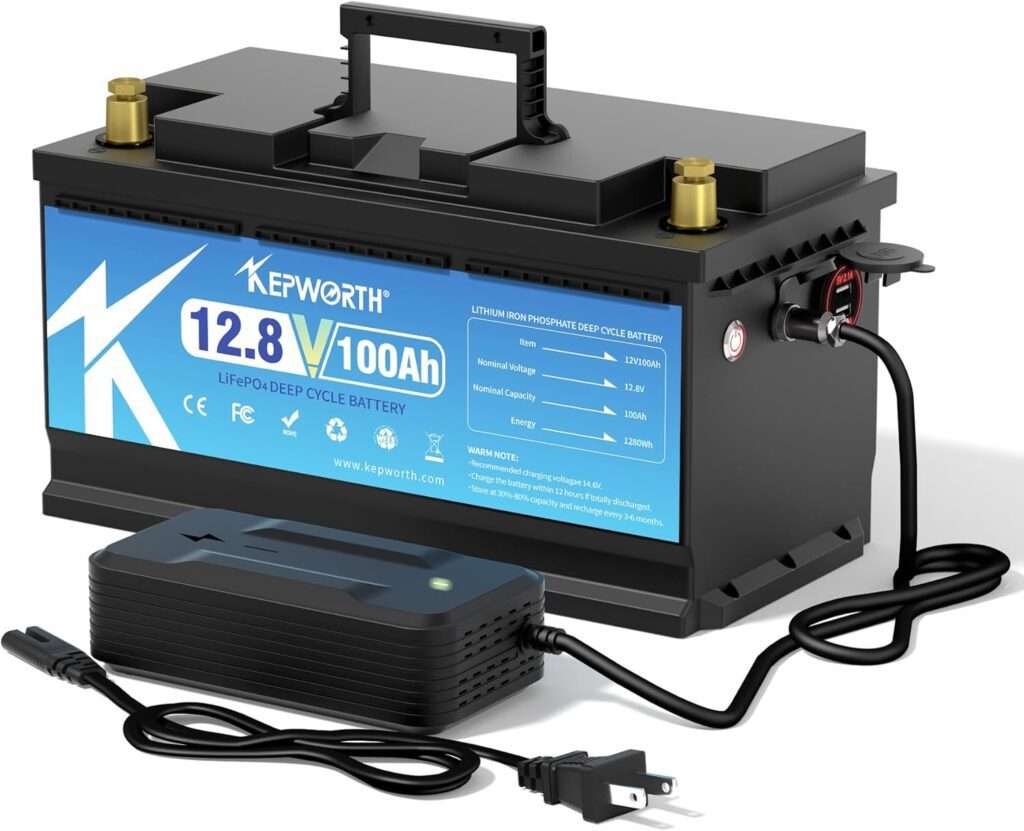
Quick Specifications
- Manufacturer: KEPWORTH
- Weight: Not specified
- Dimensions: 6.86″D x 13.8″W x 7.5″H
- Amperage: 100Ah
- Voltage: 12.8 Volts
- Battery Cell Composition: Lithium
- Reusability: Rechargeable
- Number Of Cells: Not specified
If you’re setting up solar power for your RV, you need a battery that can keep up with constant charging and discharging. In our opinion, the KEPWORTH 12.8V 100Ah LiFePO4 Battery fits that role well. It’s built for solar integration, has a solid 100A battery management system (BMS), and is engineered to last thousands of cycles. From our standpoint, that makes it a practical option for long-term off-grid RVing.
Another thing we like is the separate charging and discharge ports. It reduces the risk of wiring mistakes when integrating it with a solar setup or inverter system. Plus, the built-in USB port lets you charge small devices directly from the battery, which is pretty convenient for boondocking. From our experience, these small but useful design choices make a real difference for people who rely on solar as their main RV power source.
Pros
- Works well with solar, making it great for off-grid RVing
- Separate charge and discharge ports, reducing connection errors
- USB charging port, handy for phones, laptops, or lights
- Long lifespan, built to handle thousands of cycles
Cons
- Not waterproof, so it needs protection in wet environments
- Takes longer to recharge if fully depleted, so partial discharges are better
From our standpoint, for RV owners who rely on solar, this battery makes sense. It’s designed for smooth integration, has a smart charging system, and includes features that make off-grid power management easier. If you want something reliable for solar use, this one checks the right boxes.
9. Cold Weather Option: Renogy Deep Cycle AGM 12 Volt 100Ah Battery

Quick Specifications
- Manufacturer: Renogy
- Weight: 63.9 Pounds
- Dimensions: 13.1″ x 6.9″ x 8.6″
- Amperage: 50 Amps
- Voltage: 12 Volts
- Battery Cell Composition: Lead-Acid, AGM
- Reusability: Rechargeable
- Number Of Cells: 1
From our standpoint, this Renogy Deep Cycle AGM battery is a solid pick if you’re looking for something reliable and maintenance-free for an RV setup. In our opinion, it’s built tough and performs well even in extreme temperatures, making it a great option for people traveling in hot or cold climates. It also delivers consistent power, so running appliances like a fridge, coffee maker, or CPAP machine is no issue.
From our perspective, the low self-discharge rate is another standout feature. If your RV sits unused for a while, you won’t have to keep recharging it frequently. It also handles high discharge currents, which is useful when powering multiple appliances at once. While it’s heavier than lithium options, we think the durability and stable performance make it a strong contender for those who prefer an AGM battery.
Pros
- Handles extreme temperatures well, making it great for all-season travel
- Low self-discharge rate, so it doesn’t need constant recharging when not in use
- Delivers stable power, ideal for running multiple appliances in an RV
- Maintenance-free, so there’s no need for frequent check-ups
Cons
- Heavier than lithium options, making installation a bit harder
- Not as long-lasting as lithium batteries over extended use
From our standpoint, this Renogy AGM battery is a proper choice for RVers who want a dependable and maintenance-free power source. In our opinion, its durability, stable performance, and ability to function in extreme temperatures make it a great option for those who need something tough and long-lasting.
10. Lightweight Option: ECO-WORTHY 12V 100AH LiFePO4 Lithium Battery
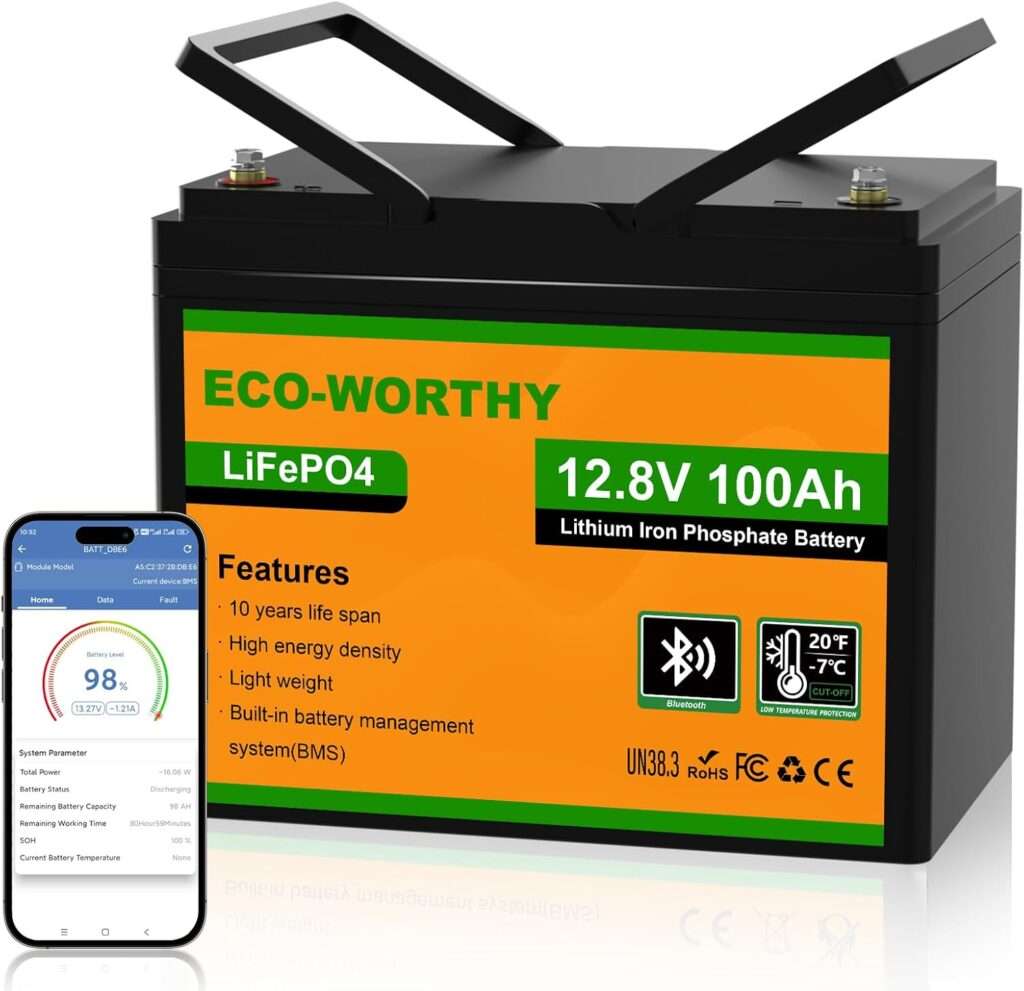
Quick Specifications
- Manufacturer: ECO-WORTHY
- Weight: 23.2 Pounds
- Dimensions: 10.24″D x 6.61″W x 8.43″H
- Amperage: 100Ah
- Voltage: 12.8 Volts (DC)
- Battery Cell Composition: Lithium-Phosphate
- Reusability: Rechargeable
- Number Of Cells: 1
From our standpoint, this ECO-WORTHY 12V 100Ah LiFePO4 battery is a solid option if you’re looking for something lightweight and reliable for your RV. It’s not one of those bulky, hard-to-handle batteries, which makes it easier to install, move around, or replace when needed. In our opinion, the Bluetooth feature is a nice touch. You can check power levels, voltage, and remaining charge right from your phone, which is super handy when you’re out on a trip and need to keep an eye on your power usage.
From our perspective, another big plus is the low-temperature protection. If you camp in colder places, this stops the battery from charging when it’s too cold, preventing damage and extending its lifespan. It’s also BCI Group 24 size, so swapping it with your existing RV battery should be straightforward without needing modifications. If you’re running a solar setup or a trolling motor, it fits right in without any hassle.
Pros
- Lightweight, which makes installation and handling much easier
- Bluetooth monitoring for real-time tracking of battery status
- Built-in protection to prevent charging in freezing temperatures
- Works well with RVs, trolling motors, and off-grid solar setups
Cons
- Single-cell design, so it may not hold up to extreme high-power demands
- Some users have reported the Bluetooth app could be more refined
From our standpoint, this battery is a solid choice for RV owners looking for a lightweight and efficient power solution. In our opinion, the compact size, Bluetooth functionality, and low-temp protection make it a proper fit for those who need reliable off-grid power without extra hassle. It’s practical, easy to use, and does what it’s supposed to do.
What are Deep Cycle Batteries?
Deep cycle batteries are specifically designed for prolonged energy discharge, unlike standard batteries that offer short, high-power bursts. These batteries are characterized by their ability to be deeply discharged and recharged repeatedly, making them ideal for RVs, solar setups, and campervan electrics. Their design caters to consistent, long-term power supply, essential for sustaining off-grid lifestyles.
What Is The Difference Between Deep Cycle and Regular Batteries
The main distinction between deep cycle and regular batteries lies in their construction and usage. Regular batteries, like those in cars, provide quick, high-energy output for starting engines but are unsuitable for prolonged energy supply. In contrast, deep cycle batteries deliver steady power over a longer period, crucial for RV appliances and solar systems.
What Ate The Benefits of Using Deep Cycle Batteries in RVs
Deep cycle batteries bring numerous benefits to RV users, including longevity, reliability, and efficiency. They are adept at handling the demands of RV living, from powering campervan kitchens to solar setups, without the frequent need for replacement. Their efficiency makes them a smart choice for sustainable, off-grid living.
Types of Deep Cycle Batteries for RVs
Navigating through the diverse world of RV deep cycle batteries can be quite an endeavor for RV owners. Each type offers unique benefits and caters to different aspects of RV living, from solar setups to campervan electrics. Understanding these variations is key to optimizing your RV’s power system for a seamless off-grid experience.
AGM Batteries
AGM (Absorbed Glass Mat) batteries, a staple in modern RV setups, excel with their low maintenance and robust build. These batteries encapsulate the electrolyte in a fiberglass mat, making them spill-proof and highly resistant to vibrations – a necessary feature for the ever-moving RV life. They offer a significant power density, meaning they pack more power in a smaller footprint, an essential factor for space-conscious RV interiors. Their ability to withstand frequent discharging and charging makes them a reliable choice for RVers who demand consistent power on the go.
Flooded Lead Acid
Rooted in traditional battery technology, Flooded Lead Acid batteries have stood the test of time due to their durability and cost-effectiveness. They work well in a variety of settings, including RV parks and remote camping sites. These batteries require regular maintenance, such as water top-ups and terminal cleaning, but their affordability makes them appealing to those on a budget. Their reliable performance in providing steady power makes them a worthy consideration for long-term RV living.
Gel Batteries
Gel batteries come with a unique advantage – their leak-proof and robust design. The electrolyte in these batteries is suspended in a gel form, offering excellent safety features, making them suitable for both RVs and marine applications. This feature is particularly beneficial for RVs that traverse diverse climates, as gel batteries are resistant to extreme temperatures. Their slow discharge rate and deep cycle capabilities ensure a consistent and reliable power supply, a boon for RVs venturing into off-grid territories.
Lithium Batteries
At the forefront of battery technology, Lithium batteries represent the future of RV power systems. Their superior efficiency, lightweight nature, and compact size make them a perfect fit for modern RVs. These batteries boast a high energy density, providing more power for longer periods without the bulk typically associated with traditional batteries. They recharge much faster than other types, a crucial feature for RVers relying on solar panels or quick stops at charging stations. Although they come with a higher upfront cost, their long lifespan and minimal maintenance needs provide cost-effectiveness in the long run.
The choice of a deep cycle battery for your RV hinges on balancing needs like space, power requirements, and budget. Each type of battery brings something unique to the table, ensuring that regardless of your RV lifestyle, there’s a power solution tailored to your needs. From the ruggedness of AGM batteries to the high-tech efficiency of Lithium, these power sources are integral to sustaining the freedom and joy of RV living.
Its clear deep cycle batteries are indispensable for RV life and off-grid adventures. Their versatility and efficiency make them a cornerstone of modern mobile living, providing the power needed for everything from basic van life essentials to complex solar arrangements. Understanding these batteries paves the way for a more informed and efficient approach to RV living.
Do You Need Deep Cycle Batteries for Your RV?
In the quest for the ideal RV experience, the choice of power source becomes a crucial decision. Whether you’re a weekend warrior or a full-time nomad, understanding the role of deep cycle batteries in your RV is essential. This comprehensive guide will help you assess whether deep cycle batteries are the right choice for your RV lifestyle.
Assessing Your RV’s Power Requirements
Determining the correct battery for your RV starts with assessing your power needs. Calculate the energy requirements of your appliances and gadgets, considering both their wattage and usage duration. This includes everything from your RV refrigerator to portable charging stations. Accurate calculation of your energy needs ensures that you choose a battery capable of supporting your lifestyle, whether you’re boondocking or staying in RV parks.
The Role of Deep Cycle Batteries in RV Lifestyle
Deep cycle batteries are designed for the unique demands of RV living. They’re ideal for prolonged use, providing steady power for both full-time RV living and occasional getaways. These batteries are especially vital for off-grid living, where consistent and reliable power is a must. Your travel habits, from frequent road trips to seasonal camping, will influence the type of deep cycle battery that best suits your needs.
Comparing with Other Power Sources
While deep cycle batteries are a popular choice, it’s important to compare them with other power sources. Solar setups and generators offer alternative solutions, each with its own pros and cons. Hybrid systems combining solar panels and batteries can provide a more sustainable and efficient power solution, especially suited for long-term travel and remote camping.
Long-term Benefits and Cost-Effectiveness
Investing in a deep cycle battery for your RV can be cost-effective in the long run. Despite the initial expense, these batteries offer longevity and reliability, reducing the need for frequent replacements. Over time, their efficiency and durability can lead to savings, making them a wise investment for both occasional and full-time RVers.
Whether deep cycle batteries are suitable for your RV depends on your specific power needs and lifestyle. Their ability to provide consistent, reliable power makes them an excellent choice for a range of RVing experiences. Assessing your requirements and understanding the long-term benefits will guide you in making an informed decision, ensuring your RV adventures are powered efficiently and effectively.
How to Choose the Best Deep Cycle RV Battery
Choosing the right deep cycle battery for your RV is more than a purchase—it’s an investment in your mobile lifestyle. This decision impacts not only the efficiency of your RV’s power system but also your overall experience on the road. Let’s dive into the essentials of selecting the perfect deep cycle battery for your RV adventures.
Battery Capacity and Your RV’s Power Needs
The first step in selecting a deep cycle battery is matching its capacity to your RV’s power needs. Consider the energy requirements of all your appliances and devices, from the campervan kitchen appliances to the portable Wi-Fi and solar setups. A battery that aligns with your energy consumption ensures you have enough power for your travels, whether it’s for weekend getaways or full-time RV living.
Understanding Battery Specifications
Deciphering battery specifications is crucial in making an informed choice. Understanding terms like amp-hours (Ah), voltage (V), and watt-hours (Wh) is essential. These specifications give you a clear picture of the battery’s performance and how it will meet your RV’s energy demands, whether you’re boondocking or connected to an RV park’s power supply.
Compatibility with Your RV’s System
Ensuring the battery is compatible with your RV’s system is paramount. This involves considering the battery’s size, setup, and technical specifications. It should fit within your RV’s designated battery space and be compatible with your RV’s electrical system, ensuring seamless integration whether you’re on a road trip or parked in a remote location.
Factors to Consider: Lifespan, Maintenance, and Climate
Selecting the right deep cycle battery for your RV isn’t just about power; it’s also about understanding how lifespan, maintenance, and climate impact your choice. These factors are crucial in ensuring that your battery not only meets your immediate power needs but also stands the test of time and elements, particularly important for those who embrace nomadic lifestyles or off-grid living.
Battery Lifespan – Estimating usage years
The lifespan of a deep cycle battery is pivotal, directly influencing the cost-effectiveness and reliability of your power system. Longevity varies across battery types, with some offering years of service, reducing the need for frequent replacements. For RVers who are constantly on the move or living off-grid, a battery with a longer lifespan is not just a convenience but a necessity for uninterrupted adventures.
Maintenance Requirements – Upkeep and care
Maintenance is a critical aspect of battery care, impacting both longevity and performance. While flooded lead-acid batteries demand regular maintenance such as water level checks and terminal cleaning, AGM and lithium batteries offer a more hands-off approach. This distinction is crucial for RV owners, as choosing a low-maintenance battery can significantly reduce the time and effort spent on upkeep, especially beneficial for those who prefer to spend their time exploring rather than maintaining.
Climate and Environmental Impact – Performance in various conditions
A battery’s ability to perform in diverse climatic conditions is a key factor in your selection process. Whether braving the frigid temperatures of mountainous regions or enduring the scorching heat of desert landscapes, your battery needs to function effectively. Understanding how different batteries react to temperature extremes and environmental factors ensures that your power supply remains consistent, no matter where your journey takes you.
Considering these critical factors – lifespan, maintenance, and climate – will guide you in choosing a deep cycle battery that not only meets your RV’s power requirements but also aligns with your lifestyle and travel preferences. This comprehensive approach ensures that your battery investment enhances your RV experience, offering reliability and peace of mind as you explore the open road.
Selecting the right deep cycle battery for your RV involves careful consideration of capacity, specifications, compatibility, and various other factors. By taking the time to assess each of these elements, you can ensure a reliable and efficient power source for your RV, enhancing your travel experience and comfort on the road. This choice is a cornerstone in building a sustainable and enjoyable RV lifestyle.
How To Install and Maintain Deep Cycle Battery In You RV
Proper installation and maintenance of your RV’s deep cycle batteries are as crucial as selecting the right RV deep cycle batteries types. This comprehensive guide delves into the nuances of setting up and maintaining these powerhouses, ensuring your RV runs smoothly on all your adventures. From safety precautions during installation to routine checks for upkeep, we cover all the essential aspects to keep your power source in top condition.
Installing Your Deep Cycle Battery
When installing a deep cycle battery in your RV, safety and precision are paramount. Start by ensuring your RV is turned off and disconnected from any power source. Securely place the battery in a designated spot, paying attention to the battery’s orientation. Connect the cables to the correct terminals, typically marked with plus and minus signs, and tighten the connections to prevent vibration-related issues. Employ protective gear, like gloves and goggles, to safeguard against accidental spills or short circuits. It’s also crucial to check that the battery is compatible with your RV’s charging system, preventing potential overcharging or undercharging issues.
Routine Maintenance Tips
Regular maintenance is key to extending the life of your deep cycle battery. For flooded lead-acid batteries, check the electrolyte levels and top up with distilled water as necessary. Clean the terminals regularly to prevent corrosion, which can impede the battery’s performance. For AGM and lithium batteries, maintenance is minimal, but regular inspections for any signs of damage or wear are recommended. Keep the battery terminals clean and ensure the connections are tight. Also, ensure the battery is charged periodically, especially if your RV is stored for extended periods, to avoid deep discharge.
Troubleshooting Common Issues
Even with meticulous maintenance, issues can arise. Common problems include the battery not holding a charge, which could indicate a deep discharge or a faulty cell. If your battery is discharging too quickly, verify that all appliances and devices are functioning correctly and not drawing excessive power. In case of underperformance in cold climates, consider insulating the battery or using a battery heater. For batteries that seem to overheat, check the charging system’s settings to ensure they align with the battery’s specifications.
Understanding the intricacies of installing and maintaining your RV’s deep cycle battery is essential for a hassle-free journey. Proper installation sets the stage for optimum performance, while routine maintenance and effective troubleshooting ensure longevity and reliability. By adhering to these guidelines, you can enjoy uninterrupted power supply, ensuring your RV adventures are as carefree and enjoyable as intended.
Maximizing the Life of Your RV’s Deep Cycle Battery
Ensuring the longevity of your RV’s deep cycle battery is crucial for uninterrupted adventures. This detailed guide focuses on best practices for maximizing battery life, covering everything from charging techniques to maintenance during storage. By following these recommendations, you can extend the lifespan of your deep cycle battery, enhancing your RV experience.
Effective Charging Practices
Optimal charging is essential for the health of your deep cycle battery. Use a charger that matches the battery’s specifications to prevent overcharging or undercharging. For AGM and lithium batteries, a smart charger that adjusts the charging rate based on the battery’s condition is ideal. Regularly monitor the battery’s charge level; deep discharging can significantly shorten its lifespan. For those using solar setups, ensure your solar charge controller is correctly set to match your battery type, crucial for maintaining a balanced charge.
Avoiding Common Mistakes
Common mistakes can drastically reduce a battery’s lifespan. Avoid discharging your battery below 50% to prevent undue strain. Ensure your RV’s electrical loads are compatible with the battery’s capacity to prevent overloading. Regularly clean the battery terminals to prevent corrosion, a common issue that impedes battery efficiency. For RVers using multiple batteries, ensure they are of the same type, age, and capacity to avoid imbalances in charging and discharging.
Storage and Winterization Tips
Proper storage techniques are vital, especially during the off-season. Store your battery in a cool, dry place to prevent capacity loss. If storing for an extended period, disconnect the battery to avoid parasitic drains. For AGM and flooded lead-acid batteries, periodically check and maintain the charge level. In cold climates, consider using a battery heater or insulating the battery to protect against freezing temperatures, which can be detrimental to battery health.
Proper care and maintenance practices are key to maximizing the life of your RV’s deep cycle battery. By adopting effective charging practices, avoiding common mistakes, and employing correct storage techniques, you can ensure your deep cycle battery remains a reliable power source. This not only saves cost in the long run but also ensures your RV is always ready for your next adventure.
How To Choose The Right Deep Cycle Battery for Your RV
Navigating the myriad options of deep cycle batteries for your RV can be daunting. The right choice powers your journey, enhancing your RV lifestyle and off-grid experiences. This guide focuses on crucial aspects to consider, ensuring you select the perfect deep cycle battery for your needs.
Analyzing Different Types of Deep Cycle Batteries
When it comes to RV deep cycle batteries, one size doesn’t fit all. The choice ranges from AGM, known for its maintenance-free nature, to Lithium batteries, celebrated for their efficiency and lightweight. Flooded lead-acid batteries offer affordability, while Gel batteries provide safety and durability. Each type has distinct features and applications, making them suitable for different RV setups and energy needs. Understanding these differences helps in choosing a battery that aligns with your RV’s power requirements and travel habits.
Determining the Right Size and Capacity
The size and capacity of the battery are pivotal for its suitability in your RV. The battery must fit in the allocated space in your RV, considering both physical dimensions and weight. Capacity, measured in amp-hours (Ah), should align with your power consumption, determined by your RV appliances and usage patterns. A mismatch in size or capacity could lead to inefficiencies or the need for unnecessary adjustments to your RV’s layout.
Cost vs. Performance: Making a Smart Investment
Balancing cost with performance is crucial in choosing the right deep cycle battery. While lithium batteries offer high performance, they come at a higher cost. In contrast, lead-acid batteries are more budget-friendly but may not provide the same efficiency or longevity. Weighing the initial investment against long-term benefits and potential savings in maintenance and replacements helps in making a financially savvy decision.
Reading Reviews and Seeking Expert Opinions
In today’s digital age, customer reviews and expert opinions are invaluable resources. Reviews from fellow RVers provide real-world insights into a battery’s performance and reliability. Expert advice, whether from RV forums, solar power experts, or battery manufacturers, offers a professional perspective on choosing the right battery for your specific needs. Leveraging these resources ensures a well-informed decision, saving you from potential pitfalls.
Choosing the right deep cycle battery for your RV is a multifaceted decision. It involves analyzing different types, considering size and capacity, evaluating cost versus performance, and seeking knowledge from reviews and experts. A well-chosen battery not only powers your RV but also complements your mobile lifestyle, ensuring peace of mind as you explore the open road.
Safety Considerations with Deep Cycle Batteries
Safety is paramount when dealing with deep cycle batteries in your RV. These power sources, essential for off-grid living and RV camping, require careful handling and awareness of potential hazards. This section covers critical safety measures to ensure a risk-free experience with your RV’s deep cycle batteries.
Handling and Transportation Safety
Proper handling and transportation of deep cycle batteries are crucial to prevent accidents. Always use protective gear, such as gloves and safety glasses, when moving batteries. Ensure the battery is securely fastened during transport to avoid shifts that could lead to short circuits or spills, especially with flooded lead-acid batteries. For heavier batteries, like certain AGM or lead-acid models, use appropriate equipment or assistance to move them safely.
Installation Safety Measures
During installation, it’s important to follow manufacturer guidelines and use the right tools. Always install the battery in a well-ventilated area to prevent gas accumulation, particularly with lead-acid batteries. Ensure all electrical systems in the RV are turned off before installation to avoid short circuits. Double-check connections for correctness; incorrect wiring can cause serious damage to both the battery and the RV’s electrical system.
Hazard Prevention: Overcharging, Leaking, and Corrosion
Preventing hazards like overcharging, leaking, and corrosion is key to maintaining battery health and safety. Use a reliable charger and regularly check the battery’s charge level to prevent overcharging, especially in AGM and lithium batteries. Inspect batteries regularly for signs of leakage or corrosion, particularly around terminals and connections. Ensure proper ventilation and regular cleaning to prevent corrosive buildup, which is common in flooded lead-acid batteries.
First Aid and Emergency Procedures
Knowing how to respond to battery-related accidents is essential. In case of acid spills from lead-acid batteries, use appropriate neutralizing agents and clean up materials. If battery gas ignites, use a class D fire extinguisher. In case of skin contact with battery acid, rinse immediately with plenty of water and seek medical attention. Always keep emergency contacts handy and ensure your RV is equipped with a first aid kit.
Adhering to safety protocols with deep cycle batteries not only protects you but also extends the life of the battery and ensures the smooth operation of your RV. By understanding and implementing these safety measures, you can enjoy your RV adventures with peace of mind, knowing you’re well-prepared for any situation.
Advancements in Deep Cycle Batteries for RVs
As the RV lifestyle continues to evolve, so does the technology behind deep cycle batteries. Advanced innovations and integration with renewable energy sources are revolutionizing how RVers power their vehicles. This segment delves into the future of battery technology, renewable energy integration, and the role of smart technology in enhancing RV battery systems.
The Evolving Battery Technology and RVs
The future of RV deep cycle batteries lies in groundbreaking innovations enhancing efficiency, longevity, and environmental sustainability. Emerging technologies like solid-state batteries promise higher energy density and safety profiles. Developments in lithium technology are focusing on extending lifespan and reducing charging times, vital for long-term RVing. Moreover, advancements in battery recycling and sustainability are set to make RV traveling more eco-friendly, aligning with the growing trend of green RVing.
Integrating Renewable Energy Sources
Integrating deep cycle batteries with renewable energy sources like solar and wind power is becoming increasingly popular among RVers. This synergy allows for a sustainable and efficient power supply, essential for off-grid living and long-term travel. Advances in solar panel efficiency and wind turbine portability are making renewable integration more practical and effective for RV users. This trend not only reduces dependency on traditional power sources but also aligns with eco-conscious travel preferences.
Battery Monitoring and Smart Technology
Modern deep cycle battery systems for RVs are increasingly embracing smart technology. Advanced monitoring systems provide real-time data on battery health, charge levels, and usage patterns, essential for effective power management. Innovations like Bluetooth connectivity and app-based monitoring enable RVers to monitor and control their battery systems remotely. This integration of smart technology ensures optimal performance, prolongs battery life, and enhances the overall efficiency of the RV’s power system.
The world of deep cycle batteries for RVs is witnessing significant advancements, driven by the need for more efficient, sustainable, and user-friendly power solutions. These innovations promise to transform the RV experience, making it more aligned with modern technological trends and sustainable living practices. As we move forward, these advancements are set to play a pivotal role in shaping the future of RV travel and off-grid living.
Wrapping Up!
In our journey through the intricate world of RV deep cycle batteries, we’ve uncovered essential insights for every RVer. From understanding the different types of batteries to mastering installation and maintenance, this guide has provided a comprehensive overview. Furthermore, we delved into the crucial aspects of selecting the right battery, ensuring safety, and embracing advanced technologies in battery systems.
Recapping our exploration, it’s evident that the choice of a deep cycle battery significantly impacts your RV experience. Whether it’s the maintenance-free convenience of AGM batteries, the affordability of flooded lead-acid, the safety of Gel batteries, or the efficiency of Lithium batteries, each type serves unique needs and preferences. Moreover, integrating renewable energy sources and smart technology represents the future of RV power systems, aligning with the trends of sustainable and tech-savvy RVing.
Making an informed and safe choice in battery selection is crucial for a seamless and enjoyable RV journey. By considering factors like capacity, compatibility, lifespan, and environmental impact, you can ensure your RV is equipped with a reliable power source. This guide aims to empower RVers to make educated decisions, balancing their power needs with safety, efficiency, and sustainability. Embrace these insights and embark on your RV adventures with confidence, powered by the perfect deep cycle battery.
Related FAQs
What is the best type of deep cycle battery for an RV?
The best choice depends on how you use your RV and what you’re willing to spend. AGM (Absorbent Glass Mat) batteries are a solid option for most RVers because they’re sealed, maintenance-free, and safer in terms of ventilation. Lithium batteries offer longer lifespan and faster charging, but they cost more upfront. Flooded lead-acid batteries are cheaper but need regular maintenance and careful handling.
How often should I charge my RV’s deep cycle battery?
Charge your battery anytime it drops to 50% or below. Letting it drain too far too often can shorten its life. Using a battery monitor helps track charge levels accurately. If you’re boondocking or parked without hookups, keep an eye on usage and recharge as needed with solar, a generator, or a compatible charger.
Can I use a regular car battery for my RV instead of a deep cycle battery?
No. Car batteries are made for short, high bursts of power to start engines—not for slow, steady discharge like RV appliances need. Using one in your RV will lead to quick wear and poor performance. Deep cycle batteries are designed to handle repeated charging and discharging over long periods.
How long does a deep cycle battery last in an RV?
Most deep cycle batteries last between 4 to 6 years with proper care. Lithium batteries can last 8–10 years or more, while lead-acid types tend to wear out sooner if not maintained. Factors like charging habits, temperature, and how deeply you discharge the battery all impact lifespan.
Is it necessary to winterize my RV’s deep cycle battery?
Yes, especially if you live in or travel through freezing climates. For lead-acid batteries, a fully charged battery is less likely to freeze. If storing the RV, disconnect the battery and keep it somewhere warm or use a maintainer. Lithium batteries are more sensitive to cold and should not be charged below freezing—store them indoors when not in use.

Jack Rivers is a long-time RVer, a husband, and a dad who’s traveled solo and now with his family. He’s learned a lot from years on the road, sometimes the hard way. From quiet mornings parked by the woods to messy evenings with the kids and a busted heater, he’s been through it all. Miles writes to share the real stuff, the small wins, and the lessons that make RV life worth it, no matter who you’re traveling with.


